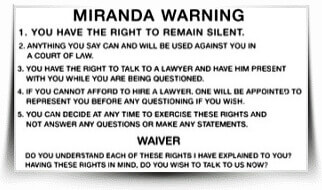Many of the rights in the Constitution and Bill of Rights, such as Habeas Corpus, The right to remain silent, and The right to an attorney, are designed to ensure that those accused of a crime are assured of those rights. Your Miranda Rights are important not only to advise you of your rights but also to the prosecution’s case against you and here’s why.
Your Miranda Rights
Even where is no confession, if you start jabbering nervously and lying (even about simple things and getting caught in them), your words could provide just enough extra proof needed to make the case, and conviction, go forward.
In 1963 Ernesto Miranda was arrested for kidnap and rape. When he was brought in for questioning about the crime he did make a confession to the police acknowledging his involvement. Most police officers believed that if the accused, spoke about a crime without knowing that they did not need to, that it was the person’s fault for not invoking that right, even if they did not know, or did not remember, that they had that right. Or as in some cases, not understood the law due to a language barrier…
In 1966, the Supreme Court ruled that the confession (statements) Ernesto Miranda made to the police could not be used as evidence, as Mr. Miranda was not aware of his rights under the constitution.
Before any pertinent questioning of a detainee (suspect) is done, the police have been required to recite the Miranda warning. The statement, reproduced below, may vary and does exist in several forms, but all have the key elements: “The right to remain silent and The right to an attorney“. These are also often referred to as the “Miranda rights.”
When you have been read your rights, you are said to have been “Mirandized.”
Note that one need not be Mirandized to be arrested. There is a difference between being arrested and being questioned. Also, basic questions, such as name, address, and Social Security number do not need to be covered by a Miranda warning. The police also need not Mirandize someone who is not a suspect in a crime.
The following is a minimal Miranda Warning
You have the right to remain silent. Anything you say can and will be used against you in a court of law. You have the right to speak to an attorney, and to have an attorney present during any questioning. If you cannot afford a lawyer, one will be provided for you at government expense.
The following is a much more verbose Miranda warning, designed to cover all bases that a detainee might encounter while in police custody. A detainee may be asked to sign a statement acknowledging the following:
- You have the right to remain silent and refuse to answer questions. Do you understand?
- Anything you do say may be used against you in a court of law. Do you understand?
- You have the right to consult an attorney before speaking to the police and to have an attorney present during questioning now or in the future. Do you understand?
- If you cannot afford an attorney, one will be appointed for you before any questioning if you wish. Do you understand?
- If you decide to answer questions now without an attorney present you will still have the right to stop answering at any time until you talk to an attorney. Do you understand?
- Knowing and understanding your rights as I have explained them to you, are you willing to answer my questions without an attorney present?
 If you find yourself in a bind and can’t quite remember your rights, feel free to print this image and carry it with you. Your best option is to observe Warning #1 because Warning #2 is the one that will sting you. As well, it is more than likely if an officer is reading your Miranda Rights to you, from a prepared card, then you may be in serious trouble. It is perfectly ok to state that you wish to end questioning and talk to a lawyer.
If you find yourself in a bind and can’t quite remember your rights, feel free to print this image and carry it with you. Your best option is to observe Warning #1 because Warning #2 is the one that will sting you. As well, it is more than likely if an officer is reading your Miranda Rights to you, from a prepared card, then you may be in serious trouble. It is perfectly ok to state that you wish to end questioning and talk to a lawyer.